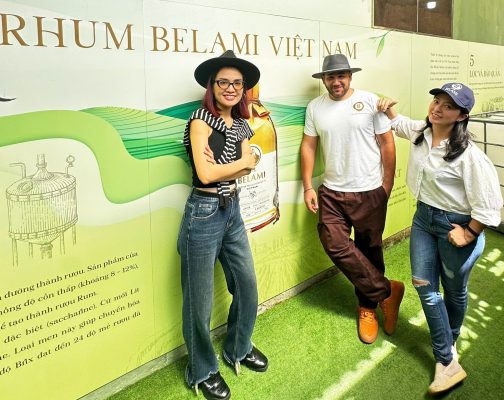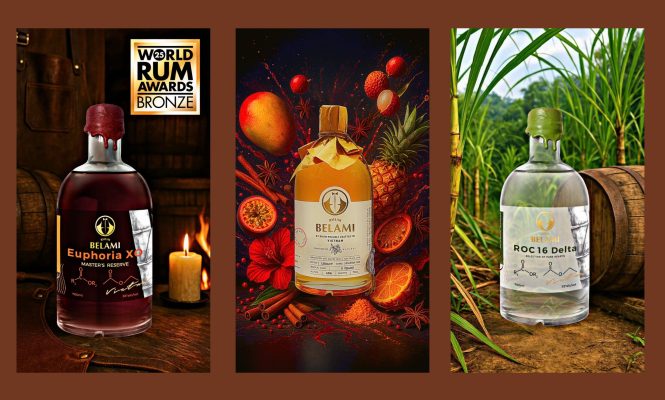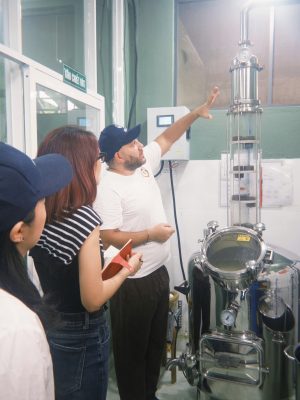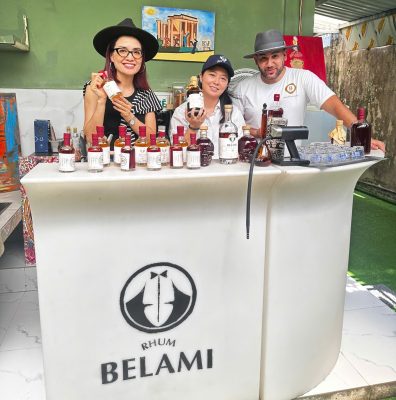When people think of rhum, their minds often drift to the Caribbean. But few know that sugarcane – the soul of rhum – originated in Southeast Asia, where Vietnam is home to some of the most fertile cane fields in the world. It is here, against all odds and outside global expectations, that Rhum Belami was born: Vietnam’s very first craft rhum brand. A pioneer, a passion project, and a proud declaration of “Made in Vietnam.”
More than a locally crafted spirit, Rhum Belami has stepped confidently onto the world stage, claiming international recognition. Since 2019, the brand has received Gold Medal for Top Rum World Spirits Awards held in France, most recently winning a Bronze Medal in 2025 at the World Rum Award . This is not just a personal victory—it’s a signal that Vietnam is quietly but steadily becoming a serious contender in the world of fine spirits.

From Sugarcane to Spirit: A Vietnamese Journey
On a scorching afternoon in Thu Duc, 20 kilometers from downtown Saigon, I found myself at a small, tucked-away distillery. There, founders Roddy and Juyee greeted me with a humble glass of chilled sugarcane juice. It was more than refreshment—it was a symbol. The beginning of a journey: from sweet sap to refined rhum, from humble beginnings to heritage.
My first impression of Roddy was one of vivid contrast—he looked every bit the artistic free spirit, clad in a cowboy hat, with a dreamer’s gaze and a bohemian flair. Yet, in conversation, he revealed a warmth and sincerity that felt deeply grounded.
Born to an Italian father and a Caribbean mother, Roddy might easily have built his legacy in Europe or the Americas. Instead, he chose Vietnam—his home for the past 10 years—not only to live, but to create something enduring. I asked him, “Why Vietnam?”
His eyes sparkled with resolve:
“Because this is where dreams are still possible.”
“In France, to truly own something of your own, you need a lot of money,” he said. “That’s why many people spend their entire lives working for big corporations. But here in Vietnam, I found freedom — the space to experiment, to create something original that hadn’t been done before. When I saw the sugarcane fields, something clicked. As a Caribbean soul, I knew: this was the place to craft rhum.”

A Belief in Vietnam’s Distilling Potential
Without a corporate budget or large-scale factory, Roddy and Juyee began by building their first still by hand. They sourced Vietnamese green and black sugarcane from the Mekong Delta and fermented the juice for up to 30 days—ten times longer than conventional methods. This patient process birthed complex flavor layers rarely found in mass-produced rums: earthy truffle, roasted seeds, subtle spice.
Once distilled, the rhum was aged in Spanish oak barrels, but the innovation didn’t stop there. Local fruits were seasoned inside the barrels for 30 days before the rhum was introduced—imprinting the wood with a truly Vietnamese fingerprint.
Roddy poured me samples: rhums fresh from fermentation, then aged three and five years. I paused with each glass—not just to sip, but to feel.
Each expression was a memory in the making.
“I want people to stop and feel when they drink our rhum,” Roddy said. “Not just mix it into cocktails. Rhum Belami is meant to be savored—pure, deliberate, emotional.”

A Legacy in Every Bottle
“We didn’t set out to just make alcohol,” Roddy shared with quiet conviction. “We wanted to create a legacy.”
Every bottle of Rhum Belami is hand-sealed and hand-signed by Roddy himself. He admits the wax-sealing process often burns his fingers—but he persists. “I want every customer to feel the fingerprint of our devotion in every detail,” he says.
Today, Rhum Belami is exported to France, Italy, Taiwan, and Mexico. Their awards—particularly from the Top Rum World Spirits Awards held in France and the World Rum Award. But perhaps the most remarkable part of their journey isn’t the accolades, but how far they’ve come from a modest workshop in Thu Duc.
Through funding challenges, regulatory hurdles, and a rising excise tax on alcohol in Vietnam—they’ve remained unwavering.
Staying the Course
“When we started, we never imagined reaching this point,” Roddy reflects.
So how did they overcome the impossible?
His answer is calm, assured:
“We focused. We showed up every day. We gave our hearts to our product. So no matter how it ends—success or failure—we’ll look back knowing we gave it everything.”
Why “Made in Vietnam” Matters
As I held a bottle of Rhum Belami in my hand, I wasn’t just holding a spirit—I was holding a story. A vision. A tribute to Vietnam’s potential to birth world-class products with soul, craft, and identity. From native sugarcane to nuanced aging, from tropical warmth to disciplined fermentation—this is a rhum that doesn’t imitate the West. It redefines what the East can offer.
Rhum Belami is not just a drink.
It’s a declaration that Vietnam can craft the extraordinary.

Know more about Rhum Belami. You can find here


 Tiếng Việt
Tiếng Việt